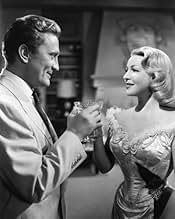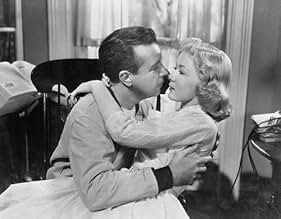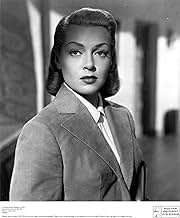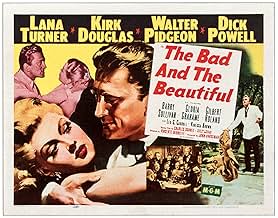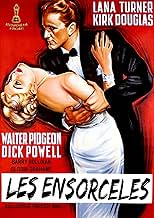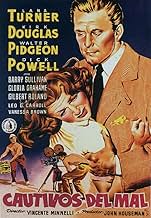VALUTAZIONE IMDb
7,7/10
17.350
LA TUA VALUTAZIONE
Un produttore cinematografico senza scrupoli utilizza un'attrice, un regista e uno scrittore per raggiungere il successo.Un produttore cinematografico senza scrupoli utilizza un'attrice, un regista e uno scrittore per raggiungere il successo.Un produttore cinematografico senza scrupoli utilizza un'attrice, un regista e uno scrittore per raggiungere il successo.
- Regia
- Sceneggiatura
- Star
- Vincitore di 5 Oscar
- 7 vittorie e 7 candidature totali
Jay Adler
- Mr. Z - Party Guest
- (non citato nei titoli originali)
Stanley Andrews
- Sheriff
- (non citato nei titoli originali)
Del Armstrong
- Georgia's Makeup Artist - Screen Test Scene
- (non citato nei titoli originali)
Ben Astar
- Joe - Party Guest
- (non citato nei titoli originali)
Barbara Billingsley
- Evelyn Lucien - Costumer
- (non citato nei titoli originali)
Recensioni in evidenza
That one line summary makes me sound like I'm calling the Bad and the
Beautiful a case in 'tough love', where director Vincente Minnelli wags
his finger at what happens to some people (cough, David O. Selznick,
cough), while also showing too the joys of working in the business. But
it's a business at its most booming time, coming out of the 40s where
the producer was king, and the director had to vie for room at times to
really get his vision in. Here the producer Jonathan Shields is played
by Kirk Douglas as someone with big ideas at first- he even has an idea
to help make a scary movie about cats even more frightening by not
showing the cats (echoes of Val Lewton). Soon he rises the ranks and
becomes big enough to really call the shots all he wants, but it also
gets in the way of personal relationships, severs ties, and sometimes
even makes him out to be monstrous (there's one shot I remember all the
time where Douglas, in a big fit of anger against Lana Turner's
character, seems like he's a whole foot taller with the ego almost
manifested). The narrative of the film is a retelling by people who
knew him, a sexy but soon disillusioned actress, a director who once
worked with Shields but then got cut off from him, and a writer played
by Dick Powell.
Rashomon or Citizen Kane it is not in trying to reveal more grandiose and amazing things about human nature, but rather a supreme rumination on the good times and the bad times, possibly more of the latter.
What's great about Douglas's portrayal is that through the stories from the three ex-friends and co-workers and lovers, he becomes a very well-rounded character. At the core, of course, is the producer who at the time had as more creative say than anyone else on the set. This brings some of the great scenes ever shown about movie-making, such as the moment when Amiel, the director, tries to put Jonathan in his place about how a scene should be shot, "in order to direct a picture you need humility". Another comes with the moment when Jonathan and his soon to be 'asistant to the producer' has to object out of just being stunned. But more than Douglas, it's also tremendous, memorable screen time for Lana Turner, perhaps in her most successful performance in just sheer acting terms (not necessarily just in presence or style like in other pictures), and for Dick Powell, who with this and Murder My Sweet has two defining roles outside of his usual niche.
With many sweet camera moves, a script that crackles with the kind of scenes and dialog that makes one wish for the glory times of Hollywood's Golden Age, and at least four or five really excellent performances, The Bad and the Beautiful might not be as astounding and near-perfect as 8 1/2 or as funny as Bowfinger, but it ranks up there with the best movies about movie-making, and can make for some fine entertainment even for those who aren't really interested in how movies are made.
Rashomon or Citizen Kane it is not in trying to reveal more grandiose and amazing things about human nature, but rather a supreme rumination on the good times and the bad times, possibly more of the latter.
What's great about Douglas's portrayal is that through the stories from the three ex-friends and co-workers and lovers, he becomes a very well-rounded character. At the core, of course, is the producer who at the time had as more creative say than anyone else on the set. This brings some of the great scenes ever shown about movie-making, such as the moment when Amiel, the director, tries to put Jonathan in his place about how a scene should be shot, "in order to direct a picture you need humility". Another comes with the moment when Jonathan and his soon to be 'asistant to the producer' has to object out of just being stunned. But more than Douglas, it's also tremendous, memorable screen time for Lana Turner, perhaps in her most successful performance in just sheer acting terms (not necessarily just in presence or style like in other pictures), and for Dick Powell, who with this and Murder My Sweet has two defining roles outside of his usual niche.
With many sweet camera moves, a script that crackles with the kind of scenes and dialog that makes one wish for the glory times of Hollywood's Golden Age, and at least four or five really excellent performances, The Bad and the Beautiful might not be as astounding and near-perfect as 8 1/2 or as funny as Bowfinger, but it ranks up there with the best movies about movie-making, and can make for some fine entertainment even for those who aren't really interested in how movies are made.
Winning an Oscar has nothing to do with the amount of on screen time, so the shortness of Grahame's role does not bother me. However, her cartoonish interpretation of a Southern Belle is simply not worthy of an Academy Award, especially when the role is intended to be seriously dramatic. Jean Hagen most certainly deserved the Supporting Actress honor for her APPROPRIATE comedic turn as an over-the-top, unfortunately voiced silent film actress in "Singing in the Rain." And, folks, that scene with an hysterical Lana Turner driving in the rain is, well, HYSTERICAL.
VM was an excellent director, but some of his films, especially the overwrought melodramas, simply do not hold up. Yes, they always look great, but often the performances in the dramas are of the scenery-chewing variety.
In regards to another user's post, I agree that the scenario of Powell's character identifying his wife is ridiculous. The same thought immediately crossed my mind when seeing it for the first time.
My feelings towards Douglas's performance are mixed. At times he hits the mark, but at others, it is pure ham.
The film is definitely worth seeing, but it does not deserve the status of "classic." Its presentation of the industry is clichéd. As others have stated, "Sunset Boulevard" blows this film out of the water.
VM was an excellent director, but some of his films, especially the overwrought melodramas, simply do not hold up. Yes, they always look great, but often the performances in the dramas are of the scenery-chewing variety.
In regards to another user's post, I agree that the scenario of Powell's character identifying his wife is ridiculous. The same thought immediately crossed my mind when seeing it for the first time.
My feelings towards Douglas's performance are mixed. At times he hits the mark, but at others, it is pure ham.
The film is definitely worth seeing, but it does not deserve the status of "classic." Its presentation of the industry is clichéd. As others have stated, "Sunset Boulevard" blows this film out of the water.
My tribute to the great Hollywood film composer, David Raksin, is long overdue. I only discovered the other day that he died a couple of summers ago at the considerable age of 92. I suppose I had thought that like most of those figures who reached their peak in the middle of the last century he had passed away many years ago. A re-seeing of "The Bad and the Beautiful" fairly recently reminded me of just how outstanding was his contribution to movies of all shades of quality. I first became aware of the uniqueness of the Raksin 'sound' on my original viewing of Wyler's "Carrie" in 1952. It is impossible to define, other than to say that it owes nothing to central European romanticism, the sound of almost all the in-house studio composers such as Newman, Stothart and Steiner, or to the tradition of 20th century symphonists such as Copland and Diamond which fed the imagination of film composers as diverse as Elmer Bernstein and David Amram. Raksin had a sound all his own as did Bernard Herrmann and Miklos Rozsa, as instantly recognisable as theirs but I feel his range is wider. He seldom repeated himself as did Rozsa who composed in the same style regardless of genre. ("Double Idemnity", "Ben-Hur" and "Madame Bovary" have nothing common apart from their same sort of watered down Kodaly-like music.) His style is intensely lyrical, conceived with a verve and passion that always transcended the most trivial movies and made them, if not worth watching, always worth listening to. Unlike many of his colleagues he seldom hit the jackpot by working on films of great quality. I think it only happened twice, with Abraham Polonsky's B movie "Force of Evil" which has become recognised as a marvellous example of film noir and of course William Wyler's "Carrie" where he was just one of many outstanding contributors to what I have long argued is possibly the greatest work of art to have ever emerged from the Hollywood studio system. Although it has its passionate advocates, I cannot share their enthusiasm for Vincente Minnelli's "The Bad and the Beautiful". It is certainly very professional in the way it slickly dissects an unsympathetic character through the flashback reminiscences of those he mistreated, but it had all been done before and considerably better in "Citizen Kane" and "All About Eve". However the film is worth watching if only to wallow in Raksin's gorgeous score. And there is plenty of it, particularly in accompanying all those voice-off narrations. And then just as one is beginning to wonder if the marvellous opening credit theme is about to be heard once too often, the composer introduces something entirely new for the Dick Powell narrative, a jaunty section based on a four-note motif (a falling perfect fifth, rising up a major sixth, then down a major seventh). The way this is subsequently developed is truly symphonic. Incidentally if you want to discover a film score that has the length and complexity of a symphony just close your eyes (you won't be missing much) and listen to "Forever Amber". Raksin in excelsis!
One thing that I've always wondered is why no one looks at Hollywood more negatively than Hollywood itself. But whatever the reason, "The Bad and the Beautiful" pulls no punches in looking at its topic. The movie portrays some people explaining how they used to be friends of producer Jonathan Shields (Kirk Douglas) but have since turned against him. There's the director whom Shields promised a directing job but betrayed him, the writer who lost his wife to Shields's actions, and the actress whom Shields drove to madness.
I thought that one of the most effective scenes in the movie was Kirk Douglas holding Lana Turner in his arms. Here he is, this overbearing, hostile character forced to almost coddle his gorgeous female star; it might be showing how he may seemingly have exalted her, but he remains in a higher position and is merely using her and sending her into insanity. And the scene of her driving the car while completely upset elaborates on this idea.
And then, there's the writer. He and his wife move from Virginia hoping to get really big in Hollywood...until tragedy strikes. It all goes to show the disaster inherent in any industry (of course, Douglas's character exacerbates any problem). But anyway, this is a formidable part of cinema history; a precursor to movies like "The Player". Also starring Dick Powell, Walter Pidgeon and Gloria Grahame (who won Best Supporting Actress).
I thought that one of the most effective scenes in the movie was Kirk Douglas holding Lana Turner in his arms. Here he is, this overbearing, hostile character forced to almost coddle his gorgeous female star; it might be showing how he may seemingly have exalted her, but he remains in a higher position and is merely using her and sending her into insanity. And the scene of her driving the car while completely upset elaborates on this idea.
And then, there's the writer. He and his wife move from Virginia hoping to get really big in Hollywood...until tragedy strikes. It all goes to show the disaster inherent in any industry (of course, Douglas's character exacerbates any problem). But anyway, this is a formidable part of cinema history; a precursor to movies like "The Player". Also starring Dick Powell, Walter Pidgeon and Gloria Grahame (who won Best Supporting Actress).
Glossy MGM soaper has many things to recommend it, not the least of which is a surprisingly grounded, natural Lana Turner (looking great, even in ordinary jammies) playing a successful movie actress who, along with a top screenwriter and director, help producer-on-the-skids Kirk Douglas stage a comeback. Not especially revealing about Hollywood, which at this stage wasn't quite ready to unmask itself, but still engaging and intriguing. Douglas is well-cast (he spits out his lines with a terse jaw--nothing new--but he's right for this part and is commendable). Turner is a revelation and deserved at the very least an Oscar nomination for her work; the picture did go on to win Academy Awards in five categories, including Gloria Grahame as Best Supporting Actress; Charles Schnee, Best Screenplay; Robert Surtees, Best Cinematography, Black-and-White; Best Art Direction-Set Decoration, Black-and-White; and Best Costume Design, Black-and-White. Well-directed by Vincente Minnelli, the picture gets less attention than something like "All About Eve", but it's actually more entertaining. *** from ****
Lo sapevi?
- QuizAt 9 minutes and 32 seconds, Gloria Grahame's performance in this movie became the shortest to ever win an Oscar. She held the record until 1976, when Beatrice Straight won for her 5 minute performance in Quinto potere (1976).
- BlooperThe story takes place over an 18-year period, roughly 1934-1952, but the hairstyles and clothing of all the women, from beginning to end, are strictly 1952.
- Versioni alternativeAlso available in a computer colorized version.
- ConnessioniFeatured in La fine del mondo (1959)
I più visti
Accedi per valutare e creare un elenco di titoli salvati per ottenere consigli personalizzati
- How long is The Bad and the Beautiful?Powered by Alexa
Dettagli
Botteghino
- Budget
- 1.558.000 USD (previsto)
- Lordo in tutto il mondo
- 2025 USD
- Tempo di esecuzione
- 1h 58min(118 min)
- Colore
- Proporzioni
- 1.37 : 1
Contribuisci a questa pagina
Suggerisci una modifica o aggiungi i contenuti mancanti



